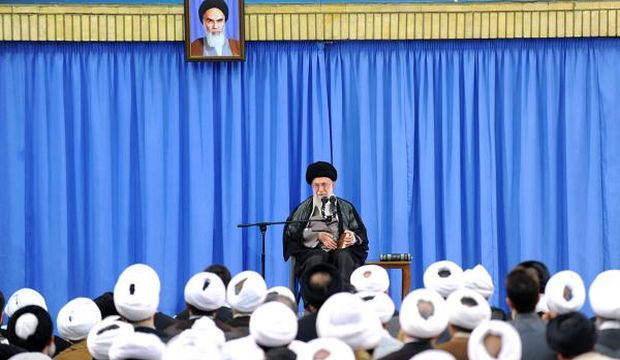
A handout picture released by the official website of the Center for Preserving and Publishing the Works of Iran’s Supreme Leader Ayatollah Ali Khamenei, shows him delivering a speech in Tehran on September 27, 2015, during which he demanded Saudi Arabia apologize for a stampede that killed nearly 770 pilgrims at the Hajj, at least 144 of them Iranians. (AFP Photo/HO/Khamenei.ir)
Ahvaz, Asharq Al-Awsat—Several Iranian officials have criticized Tehran’s response to last week’s Hajj stampede that killed 769 pilgrims, with some claiming Iran is attempting to score “political points” by blaming Saudi authorities for the tragedy.
Iran’s Supreme Leader Ayatollah Ali Khamenei and President Hassan Rouhani have both blamed Saudi authorities for the tragedy last week, with Khamenei demanding Saudi Arabia “apologize to the world’s Muslims and the bereaved families,” according to state news agency IRNA.
Iran has the highest recorded number of dead from the incident, with at least 144 Iranians killed in the stampede, according to official figures.
However, Mohammad Hashemi, the head of the office of former Iranian president Akbar Hashemi Rafsanjani, has pointed to the difficulty in “making judgments on matters like this,” and said it would be wrong to blame the Saudi authorities for the tragedy.
“We have no right to point the fingers of blame at the authorities in this country [Saudi Arabia],” he said.
Prominent Iranian academic Sadegh Zibakalam meanwhile said the Iranian response to the tragedy was a result of the political disagreements between both countries on Syria, Yemen, and other regional crises. He said Iran was attempting to usie the tragedy to score “political points” against Riyadh.
He called Tehran’s response “extreme and racist.”
Habib Jabr, head of the Arab Struggle Movement for the Liberation of Ahvaz—an Iranian–Arab separatist movement—went even further and said the incident may have been engineered by Tehran in an effort to discredit Saudi Arabia.
On Friday an official from Iran’s Hajj mission told Asharq Al-Awsat the stampede occurred after a group of around 300 Iranian pilgrims failed to follow orders requiring them to wait for clearance to leave the Jamarat area near where the stampede took place.
Instead, the official said the group went back to their mission’s headquarters as other groups were on their way to the site as scheduled, stopping en route and “causing the coming pilgrims to take a route no more than 20 meters wide.”
The official added that such behavior often leads to tragic consequences in crowded areas.
Speaking in New York as he attends the UN General Assembly, Saudi Foreign Minister Adel Al-Jubeir was also critical of Iran’s response to the tragedy. He said Iran “should know better than to play politics with a tragedy that has befallen people who were performing their most sacred religious duty,” according to AFP.
Saudi Arabia’s King Salman Bin Abdulaziz has meanwhile ordered an official investigation into the incident.
“We will reveal the facts when they emerge. And we will not hold anything back,” Jubeir said.
“I would hope Iranian leaders would be more sensible and more thoughtful with regards to those who perished in this tragedy, and wait until we see the results of the investigation.”
